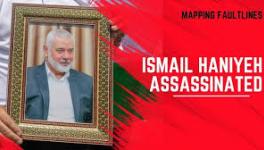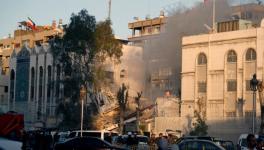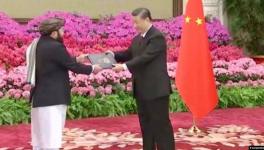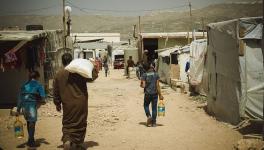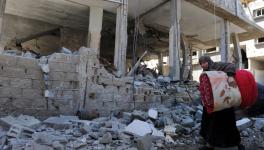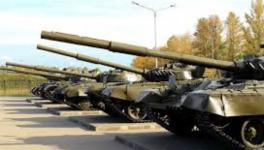Decoding the Libyan Labyrinth - Interview with Vijay Prashad
Vijay Prashad, professor of International Studies, Trinity College, Connecticut discusses the latest developments in Libya in the context of the pro-democracy movements in the North African/ Arabian world.
Prabir Purkayastha(PP): Hello and welcome to Newsclick. Today we have Vijay Prashad, to who will be linking through Skype to discuss the Libyan events. Vijay, good to have you with us.
PP: I believe, the way things are turning out in Libya, it does seem that Gaddafi's days are numbered. What do you think?
VP: Well it is hard to say with certainty; Gaddafi is very stubborn man in a way. He has been in power for forty two years. He has got various forms of military power at his disposal. One of his sons, for instance, has gathered a battalion of troops around Tripoli. So they are making a siege formation. Gaddafi has also got Serbian mercenaries. So I would not say the game is going to end quickly as it ended for Ben Ali and for Mubarak. In North Africa, they are saying that Ben Ali left on Friday, Mubarak left on Friday and Gaddafi will leave on Friday. But I don't think it's that simple.
PP: So It may not happen this Friday, but if you look at what happening, he seems to have lost the eastern part of Libya, which is really half the oil wealth of Libya, as well. So one half of the country in terms of the actual population of oil wealth he seems to have lost.
VP: Yes, exactly, in a sense Gaddafi has never had hegemony over Eastern Libya. Eastern Libya has posed the problem since 1969. In various times, since 1969, there have been rebellions in eastern Libya against Gaddafi and he has put them down. The confederacy of tribes in eastern Libya are extremely independent. They have various grievances against Gaddafi that are long standing. One of which is that they feel king Idris the first was their king and Gaddafi’s overthrowing of him in 1969 took power away from them. So there are historical grievances. Gaddafi has not really had full control over the region, but now, certainly, he has lost control of the space of east Libya. He has lost control over some of the army which was garrisoned in eastern Libya. So, certainly, the eastern part seems to have removed Gaddafi’s authority entirely.
PP: If you look at what we are seeing, of course, it is very difficult to predict which way things will go, but nevertheless it does seem that Gaddafi has lost whatever revolutionary potential or pretensions he had earlier. The course of Nasserite revolution which he led in 1969 that seems to have run out and what we really see is a Gaddafi who has made up with the neo liberal agenda and has been for the last seven, eight years quite close to what United States has been doing in Middle East and his latest statements, blaming Al Qaida, Islamic fundamentalism and so on. Seems to also see that he is start sort of tying to play up to the West on this one.
VP: Well, firstly, Gaddafi's Nasserite revolution ended in early 1980. Fortunately for him, the American President was Ronald Regan, who had the bad taste to bomb Gaddafi's household, and kill his fifteen year daughter and that bought Gaddafi a sort of revolutionary lease of life. In other words, people did not see that beneath the rhetoric and the sort of demonisation of Libya, Gaddafi had already changed the nature of his revolution. What he called a revolution within a revolution. He began to privatise large sections of the economy. They began to push for certain kinds of agricultural reforms, so called, which benefited big land owners. From the Nineteen Eighty, a neo liberal agenda has come into the Libyan economy. So that's one thing to keep in mind. The second thing to keep in mind is that since the 1990’s during the Algerian upsurge, Gaddafi began to fear, greatly, the emergence of a kind of Salafist Islamic politics against him. And he used to say in the nineteen nineties that that Salafism is going to be rooted in eastern Libya. His historical enemy, as it were. So on the one side, there was economic neo liberalism and on the other side, there was this slow or may be gradual alliance or allegiance with the western paranoia over the growth of Islamism in North Africa. Gadaffi after 9/11 was a quick convert to the global war on terror. When the United States started to talk about Al Qaeda in the Maghrib, Gaddafi very quickly came on board. In fact, now, in the rambling speech he made two days ago, he said, once again, that the Al Qaeda in the Maghrib is gathering in eastern Libya. I heard some rumours yesterday that Gaddafi is freeing some Salafi prisoners from Tripoli’s jails and sending them to the east to create exactly what he is saying is going to happen, so that he can then bomb them. So at least on these two fronts, there is on the neo liberal side of things and on the question of global war on terror, Gaddafi has gradually moved his Nasserite revolution to it’s opposite.
PP: It's interesting that the West sees him as a figure who is anti-West and needs to be overthrown. In a sense, he has a very different vibe, if you will, from what Mubarak, for instance, had with the West.
VP: Well yes, that has something to do with Gaddafi's history. He had a twenty two year history of being an anti-imperialist radical. It has something to do with his own turbulence, his own kind of bizarre political views. One minute he is hundred percent behind the West, next minute he is talking about the need for Europe to become Islamic continent. I mean he was in a European meeting recently where he gave a speech saying that Islam is the future of Europe. He is a quite a bizarre character. He is embarrassing to the barons of Davos. They very much liked Ben Ali. Ben Ali and Tunisia, for instance, were chosen in 2010 in the Global competitiveness report from Davos as the leading country to invest in, in Africa. Ben Ali was a very sophisticated man. He would be able to sit with Sarkozy to talk about French literature. Whereas Gaddafi was an embarrassment even if he was a craven ally in the last two years of the United States global war on terror.
PP: Vijay, if you look at what's happening in West Asia and North Africa, it's very clear we have a democratic upsurge that is taking place. Not clear which way it will go, but nevertheless a clear democratic upsurge. Do you think that in the long run, this will mean that in West Asia and North Africa, we will get normal politics? Not the kind of authoritarian regimes where there is really an absence of politics. Do you think that is likely to happen?
VP: Well, North Africa suffered and Gulf States suffer more than any where else in the world from the resource curse, obviously. Libya has the world's best quality oil. It has so called ‘sweet oil’. Even though it only produces four percent of the world's oil output. It has the best output, the best oil, which you know, better than I, and so there are lots of reasons why the mandarins of the world order don't want to see this region go out of their control completely. But it is very clear that if we can say in the early two thousand South America exited from the hegemony of the United States order, the Arab world seems to be searching for a similar exit now. It is also clear and this is why I want to be a little cautionary, for instance in Bahrain there was the upsurge at the Pearl roundabout. But then few days ago, the King of Bahrain decamped for Riyadh, where he gave substantial Jalabia for the king of Saudi Arabia and they discussed how to deal with the Shia uprising against the Sunnis. So they are trying to make this into a sectarian matter. In North Africa there is the Boogey-man of the Muslim Brotherhood. So the people in authority and power are not going willingly. In other words, Ben Ali is now in Saudi Arabia, Mubarak is at the sea side. The leaders have been removed. But so far, we haven't seen the structures of power being threatened at all. It is true in Egypt even the United States has said revoke the emergency laws. They are saying revoke the emergency laws, but the massive infra structure of the state is not on the table to be removed. What I would suggest is that yes, North Africa and the Gulf states are looking for an exit from US hegemony, but it's not entirely clear right now that the exit is going to be as easily found perhaps as the South American found it. You know at least by 2003, there they had a more advanced agenda struggled against neo liberalism for ten years. They had the institutional and organisational capacity to carry forward the people's grievances. I am not sure right now that the game is so clear in the Arab world and the North Africa.
PP: At least the start of democratic politics in some of the countries can open the way where previously you really had political stagnation and logjam. Really we were not seeing developments taking place. So to that extent...
VP: Absolutely, for instance, I would say this is, for me, the most remarkable event in the Arab world in my life time and I think this is the beginning of a new opening which is why one has to be both optimistic and cautious at the same time. This is not the end of a revolution. This is just the beginning phase of a new part of the revolution. I fear very much that the counter revolution is going to be very harsh. Today, the British government has sent another warship to sit off the coast of Libya. In 2008, when Hezbollah and the government of Lebanon were fighting, the Saudi King at a time talked to the American Ambassador and said we need to create an Arab force from the Arab periphery to enter Lebanon and prevent the increase of the Iranian powers. I fear that the Europeans, Americans and the Saudis are going to try their very best to colour this revolutionary upsurge as an Iranian influenced upsurge, which is not true. You know we have to be very cautious. Here there are two problems. One, the local despots like Ben Ali, Gaddafi etc., and then there is, of course, the large contradictions against imperialism. Just because the large contradictions against imperialism exist does not mean that one defends Gaddafi. I think that is a very narrow minded kind of approach. There are two problems here. The immediate problem and the larger problem, both are to be confronted to make space for what you call a normal politics that can emerge in the Arab world.
PP: Thank you Vijay, we will come back to you for other issues as well. Thanks.
Get the latest reports & analysis with people's perspective on Protests, movements & deep analytical videos, discussions of the current affairs in your Telegram app. Subscribe to NewsClick's Telegram channel & get Real-Time updates on stories, as they get published on our website.










